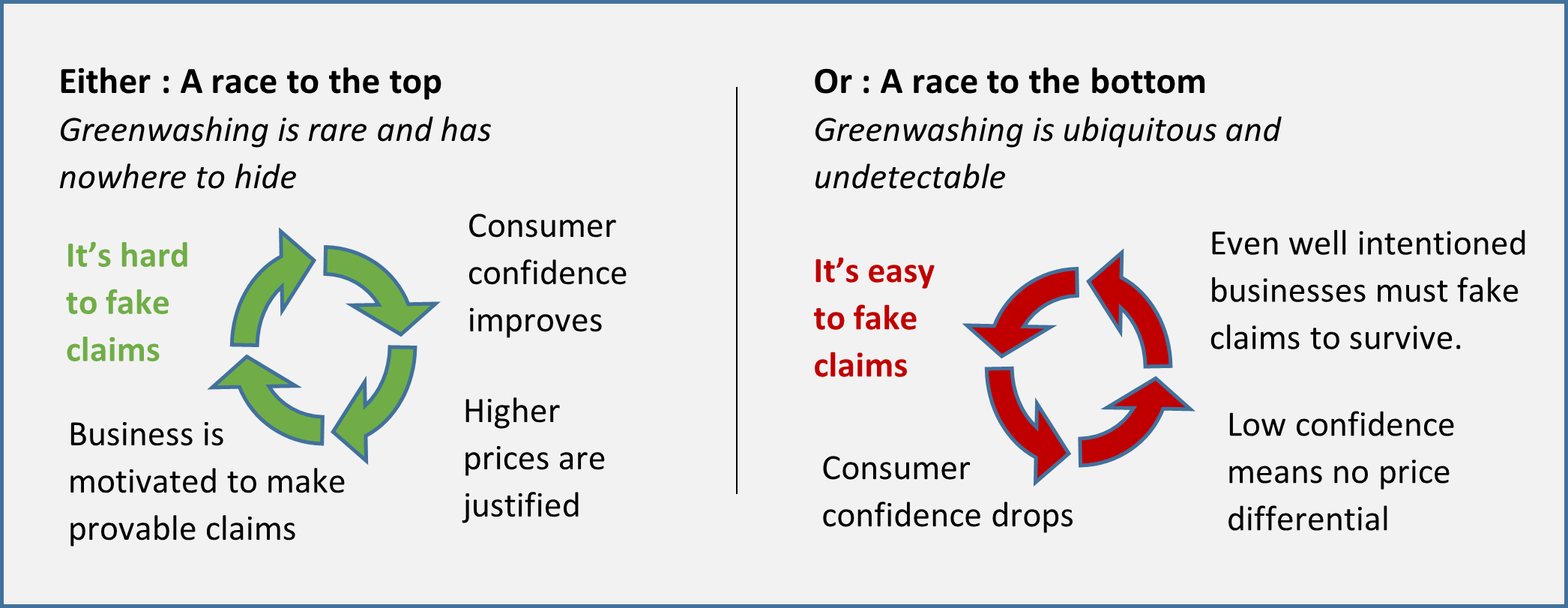Transparency at scale
Digital solutions for trust, resilience and sustainability: verifiable credentials in supply chains
other
Project Details
|
Relevant SDG targets:
As a framework for globally scalable supply chain transparency that supports any ESG criteria imposed on any product by either an ESG standard or a regulation, Recommendation 49 targets
- SDG 6 – Clean water and sanitation
- SDG 7 – Affordable & clean energy
- SDG 8 – Decent work and economic growth
- SDG 11 – Sustainable cities and communities
- SDG 12 – Responsible consumption & production
- SDG 13 – Climate action
- SDG 14 – Life below water
- SDG 15 – Life on land
Project Purpose
As regulatory and consumer pressures drive up demand (and justify premium prices) for sustainable goods, so the commercial incentive to make fake sustainability claims will increase.
- EC investigation2 : 59% of environmental claims had no evidence and 42% were deemed false or deceptive.
- Fast Company3: 68% of executives admit their company is guilty of greenwashing.
- Survey4: 78% of consumers believe that companies should be environmentally responsible and are willing to pay premiums for confidence in those claims.
At COP 27, Secretary General Guterres clearly stated that the UN has : “Zero Tolerance for Greenwashing”5. There is already a significant difference between consumer expectation and market Behaviour. There are two plausible pathways out:

The UN/CEFACT mission of “digital standards for sustainable supply chains” provides ideal positioning for this recommendation to nations that aims to make fake claims hard and therefore drive industry to compete in a “race to the top” where commercial motivations exist for stronger and strong evidence of sustainable products.
Building on UNECE Rec#466 which defined standard processes and data structures for textile & leather traceability & transparency and guided by principles in the VC white paper7, this new recommendation will provide guidance for nations on scaling traceability, transparency and trust in supply chains so that unsustainable practices have nowhere to hide.
- https://www.un.org/sites/un2.un.org/files/high-level_expert_group_n7b.pdf
- https://ec.europa.eu/commission/presscorner/detail/en/ip_21_269
- https://www.fastcompany.com/90740501/68-of-u-s-execs-admit-their-companies-are-guilty-of-greenwashing
- https://blog.gitnux.com/greenwashing-statistics/
- https://www.un.org/en/delegate/%E2%80%98zero-tolerance-greenwashing%E2%80%99-guterres-says-report-launch
- https://unece.org/trade/traceability-sustainable-garment-and-footwear
- https://unece.org/sites/default/files/2022-09/WhitePaper_VerifiableCredentials-CBT.pdf
Project Scope
This project will deliver a new UNECE recommendation document that will provide guidance to nations on the implementation of scalable supply chain traceability, transparency and trust frameworks that will enhance sustainability and resilience. |
Project Deliverables
Deliverable 1 - Policy Recommendation Deliverable 2 - Technical Specification Deliverable 3 - Guidelines |
Exit Criteria
Deliverable 1 & 2: Public Review logs demonstrating all comments have been satisfactorily resolved; Final document ready for publication. Deliverable 3: Final document ready for publication. |
Impact analysis
Regulators : Combat greenwashing and uplift export market access.
Industry: Meet supply chain due diligence obligations for you and your customers.
Certifiers : Provide digitally verifiable trust of ESG compliance.
Software Providers : Empower your customers to participate in sustainable digitised supply chains.
Successful impact is measured by uptake metrics by each of the stakeholder categories above. The recommendation will seek commitment via a sustainability pledge and then will track successful implementations via a self-service implementation test & verification tool. Uptake targets are based on existing 100+ sustainability pledges received for the textile & leather traceability program.
Stakeholder | Implementations pledged / completed by years after publication | ||||
Year | 2024 | 2025 | 2026 | 2028 | 2034 |
Regulators | 10 / 0 | 20 / 10 | 50 / 20 | 100 / 50 | 250 / 200 |
Industry | 50 / 5 | 200 / 20 | 1000 / 250 | 10,000 / 3,000 | 100,000 / 50,000 |
Certifiers | 20 / 1 | 50 / 20 | 100 / 50 | 200 / 100 | 500 / 300 |
Software | 20 / 5 | 50 / 20 | 100 / 50 | 200 / 100 | 500 / 300 |
Project Team Membership and Required Functional Expertise
Membership is open to UN/CEFACT experts with broad knowledge in the area of: Supply chain sustainability & resilience. Verifiable Credentials & the web of trust, In addition, Heads of Delegations may invite technical experts from their constituency to participate in the work. Experts are expected to contribute to the work based solely on their expertise and to comply with the UN/CEFACT Code of Conduct and Ethics and the policy on Intellectual Property Rights. |
Geographical Focus
The geographical focus of the project is global. |
Beneficiaries
For developing economies : low cost of adoption, paper-friendly digital processes. |
Initial Contributions
The following contributions are submitted as part of this proposal. It is understood that these contributions are only for consideration by the Project Team and that other participants may submit additional contributions in order to ensure that as much information as possible is obtained from those with expertise and a material interest in the project. It is also understood that the Project Team may choose to adopt one or more of these contributions “as is”. |
This project builds upon work already completed by UNECE and partner organisations.
- Rec 46 - https://unece.org/sites/default/files/2022-01/ECE-TRADE-463E.pdf
- T & L BRS - https://unece.org/sites/default/files/2021-03/BRS-Traceability-Transparency-TextileLeather-Part1-HLPDM_v1.pdf
- VC White paper - https://unece.org/sites/default/files/2022-09/WhitePaper_VerifiableCredentials-CBT.pdf
- BSP 22B based Supply chain JSON-LD vocabulary - https://vocabulary.uncefact.org/
- GS1 CBV & EPCIS 2.0 - https://www.gs1.org/standards/epcis
- ITC Standards mapping - https://standardsmap.org/en/identify
Resource Requirements
Participants in the project shall provide resources for their own participation. The existence and functioning of the project shall not require any additional resources from the UNECE secretariat Note that additional secretariat resources may be required or this project (community engagement, specialist advice, implementation testing) however these additional resources will be funded via contributions from some project member organisations (government & commercial). Any additional request: Engagement of the Team of Specialists. |
Project Proposal Files
